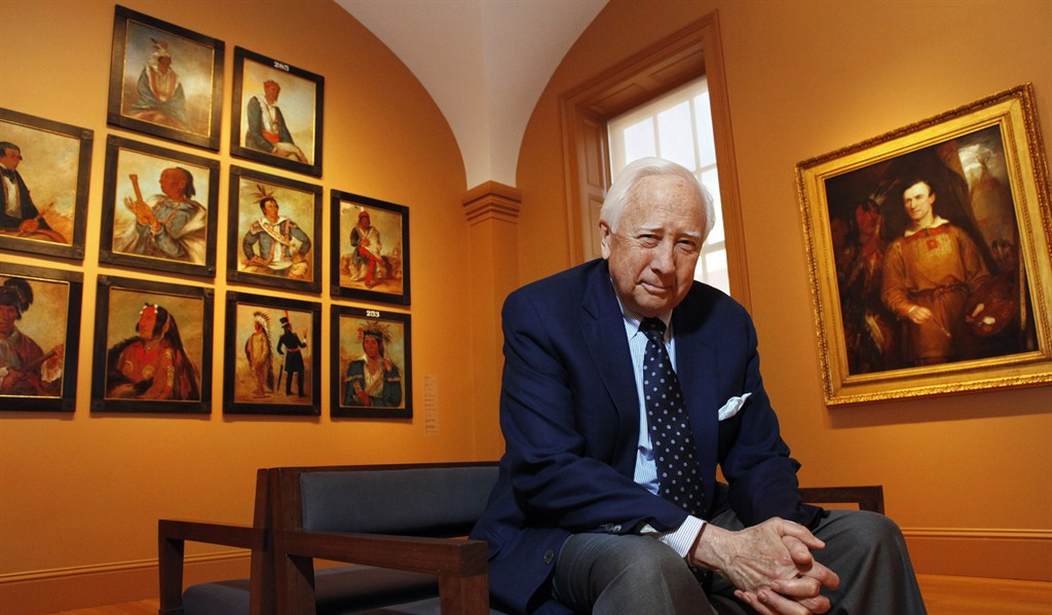Historian, author, and television host David McCullough died on Sunday at the age of 89. His life spanned the most consequential period in world history — from the 1930s and the rise of Hitler to the rise of the radical left worldwide in this decade. When McCullough was born, Hitler was beginning his reign of terror. His death may mark the beginning of the end of the American republic.
McCullough would have found that last statement overwrought and melodramatic. But that’s the historian in him. McCullough had a deep and abiding affection for America — a fact that he demonstrated with extraordinary clarity in his books as well as the projects he took on for television. His narration of Ken Burns’ epic documentary The Civil War in 1990 and his extraordinary work on The Brooklyn Bridge reveal a heartfelt passion for America missing from a lot of documentaries about the country today.
His two Pulitzer Prizes for John Adams and Truman told the stories of these two great Americans in a vivid and entertaining fashion. But he was criticized for not lambasting the two men for their racism and, in Truman’s case, telling the story of the decision to drop the atomic bomb without any bombastic, anti-American baggage.
Critics saluted him as a literary master, adept at imbuing the familiar with narrative drama and bringing momentous events to life through small details and the accounts of individual witnesses. A prime example was his rendering of the Second Continental Congress in 1776, central to the Adams book, in which he captured not only the frustrating day-to-day wrangling over declaring independence as the British fleet approached, but also the sights and smells of a mucky Philadelphia summer, the quality of local architecture and local beers, and the contrasting personalities of two brilliant allies and future enemies.
“Jefferson was devoted to the ideal of improving mankind but had comparatively little interest in people in particular,” Mr. McCullough wrote. “Adams was not inclined to believe mankind improvable, but was certain it was important that human nature be understood.”
“I think of writing history as an art form,” he said in an interview in 2008. And McCullough’s art was a sublime mix of fact and atmospherics. The author would imbue his subjects with minute detail about the times in which they lived, the society they lived in, and the scenery they would be a part of. It made for riveting reading and lent itself to TV docudramas, as both Truman and John Adams became.
“Incredibly, you don’t want him to shut up,” one admirer, the journalist and blogger Gary North, wrote at the time. If Americans were at a loss to understand their history, he continued, they could count on David McCullough: “His voice — not imperious, yet not exactly soothing, either — comes on, and we become more calm.”
Mr. McCullough was the host of the public television series “American Experience” from 1988 to 1999 and the narrator of some of its episodes. He was also the host of the television magazine “Smithsonian World.”
“A great historian is gone today,” the biographer Robert Caro said in a statement on Monday, adding, “There is only one solace: His books will endure, helping America understand its past.”
But given the radical criticism of McCullough’s last book, The Pioneers: The Heroic Story of the Settlers Who Brought the American Ideal West, the author may have breathed a sigh of relief as his last breath. Using the word “heroic” to describe white settlers heading west no doubt gave some on the left the vapors.
, a Harvard history professor, didn’t have much good to say about early American settlers or David McCullough.
If every generation of Americans gets the visionary colonizer it deserves, we get Elon Musk, but people in the early Republic got the Rev. Manasseh Cutler. Musk wants to settle Mars. In the 1780s, Cutler set his sights on the Ohio Territory, the subject of David McCullough’s new book, “The Pioneers.” Plans for Martian colonies dwell on technical feasibility; Ohio’s earlier colonization is a reminder that humans’ treatment of one another matters to such schemes, too.
The difference between Chaplin and McCullough is that McCullough makes an effort to contextualize the pioneers. He doesn’t excuse their behavior. He doesn’t defend it. He offers the reader what it was at the time and invites us to put what happened in our own context.
Historians rarely do that anymore. They want to shame us into adopting their point of view or leave out context entirely. Allowing readers to think for themselves sets McCullough apart from most historians today.
In an appearance on CBS This Morning in 2017, McCullough talked about his latest book at the time: The American Spirit: Who We Are and What We Stand For.










